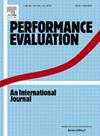Virtual caching with apportioned objects for mobile virtual reality
IF 0.8
4区 计算机科学
Q4 COMPUTER SCIENCE, HARDWARE & ARCHITECTURE
引用次数: 0
Abstract
We consider a content-caching system for Virtual or Augmented Reality (VR/AR) that is shared by a number of user groups. The cache could be located in an edge–cloud datacenter and the users could be mobile. Each user group operates its own LRU-list of a certain capacity in the shared cache. The length of objects simultaneously appearing in plural LRU-lists is equally divided (apportioned) among them, i.e., object sharing among the LRUs. We provide a working-set approximation for this system to quickly estimate the cache-hit probabilities for objects apportioned across user groups. We also prove that a solution to the working-set approximation exists. A way to reduce ripple evictions is discussed and some numerical performance results are provided based on Zipf-distributed object popularities. To evaluate our apportioned object sharing system in a VR context, we introduce a benchmark specifically designed for VR streaming, addressing the latency and Quality of Experience (QoE) challenges that arise due to VR’s dynamic fields of view (FoVs) and user synchronization requirements. Using the VR benchmark, we present additional numerical results for cache-hit rates and users’ QoE to illustrate the system’s effectiveness under VR streaming conditions.
为移动虚拟现实分配对象的虚拟缓存
我们考虑了一个由多个用户组共享的虚拟或增强现实(VR/AR)的内容缓存系统。缓存可以位于边缘云数据中心,用户可以是移动的。每个用户组在共享缓存中操作自己的一定容量的lru列表。同时出现在多个lru -list中的对象长度在多个lru -list中平均分配,即lru之间的对象共享。我们为该系统提供了一个工作集近似值,以快速估计跨用户组分配的对象的缓存命中概率。我们还证明了工作集近似的一个解的存在。讨论了一种减少波纹驱逐的方法,并给出了基于zipf分布对象流行度的一些数值性能结果。为了在VR环境中评估我们的分配对象共享系统,我们引入了一个专门为VR流设计的基准,解决了由于VR的动态视场(fov)和用户同步要求而产生的延迟和体验质量(QoE)挑战。使用VR基准,我们给出了额外的缓存命中率和用户QoE的数值结果,以说明系统在VR流条件下的有效性。
本文章由计算机程序翻译,如有差异,请以英文原文为准。
求助全文
约1分钟内获得全文
求助全文
来源期刊

Performance Evaluation
工程技术-计算机:理论方法
CiteScore
3.10
自引率
0.00%
发文量
20
审稿时长
24 days
期刊介绍:
Performance Evaluation functions as a leading journal in the area of modeling, measurement, and evaluation of performance aspects of computing and communication systems. As such, it aims to present a balanced and complete view of the entire Performance Evaluation profession. Hence, the journal is interested in papers that focus on one or more of the following dimensions:
-Define new performance evaluation tools, including measurement and monitoring tools as well as modeling and analytic techniques
-Provide new insights into the performance of computing and communication systems
-Introduce new application areas where performance evaluation tools can play an important role and creative new uses for performance evaluation tools.
More specifically, common application areas of interest include the performance of:
-Resource allocation and control methods and algorithms (e.g. routing and flow control in networks, bandwidth allocation, processor scheduling, memory management)
-System architecture, design and implementation
-Cognitive radio
-VANETs
-Social networks and media
-Energy efficient ICT
-Energy harvesting
-Data centers
-Data centric networks
-System reliability
-System tuning and capacity planning
-Wireless and sensor networks
-Autonomic and self-organizing systems
-Embedded systems
-Network science
 求助内容:
求助内容: 应助结果提醒方式:
应助结果提醒方式:


